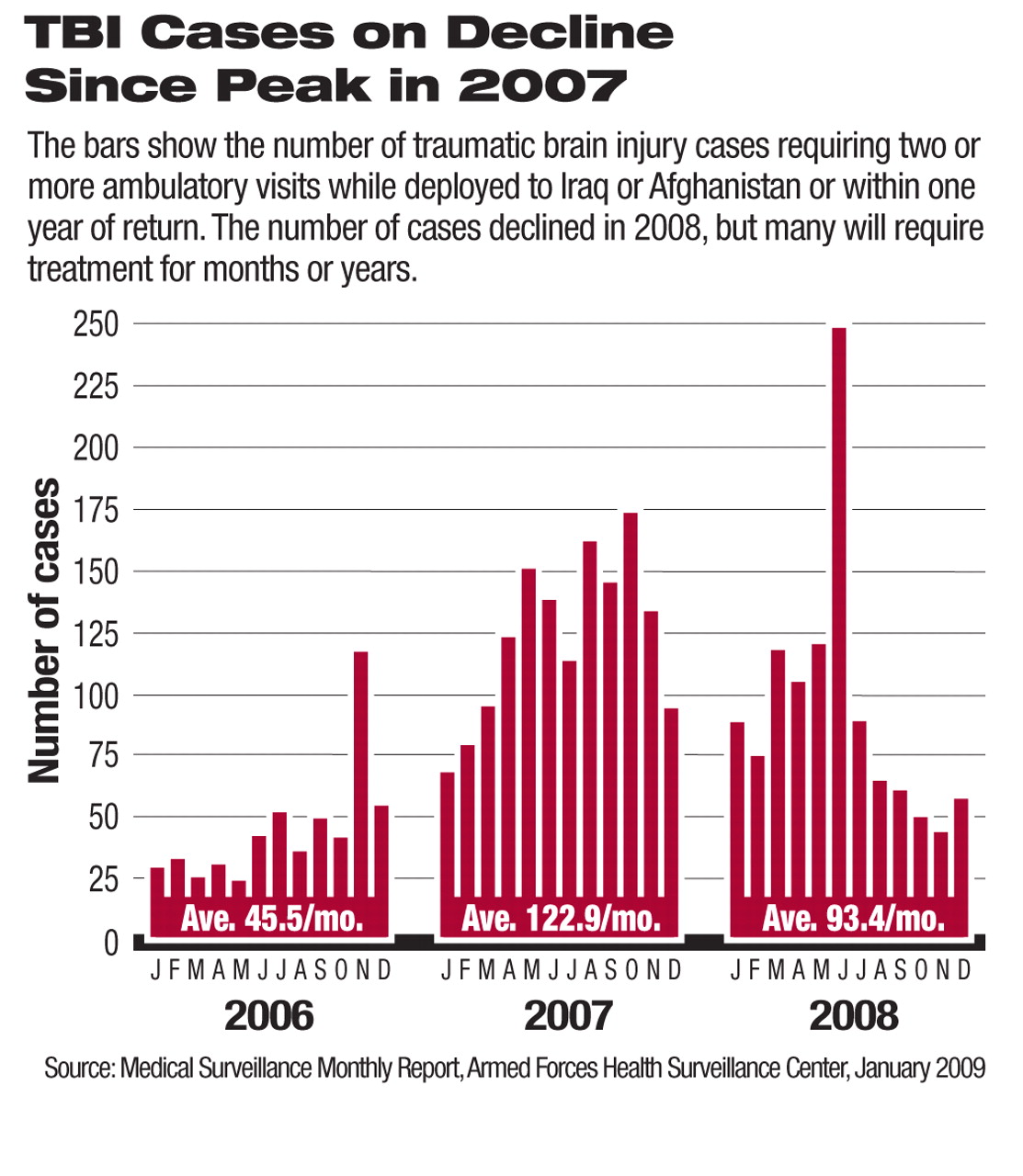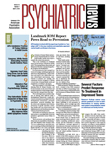Tens of thousands of U.S. troops returning from Iraq and Afghanistan may need primary or specialized care for traumatic brain injuries, stated Brig. Gen. Loree Sutton at a Pentagon briefing in March.
“So far, 10 to 20 percent of returning troops screen positive for some sort of TBI [traumatic brain injury], although not all require treatment,” said Sutton, a psychiatrist and director of the Defense Centers of Excellence for Psychological Health and Traumatic Brain Injury. Those overall numbers could amount to between 180,000 and 360,000 soldiers, given that 1.8 million Americans have served in Iraq and Afghanistan.
Those numbers may seem high at first glance, but hospitalizations for TBI among members of the armed forces peaked at an average of 50 a month in 2007 and declined to about 31 a month in 2008, according to the Armed Forces Health Surveillance Center. Multiple ambulatory visits showed a similar pattern over those two years as well (see chart).
Sutton emphasized that of those endorsing TBI symptoms, about half have only transient symptoms that resolve before their return. The other half may have sleep, headache, vision, or cognitive problems for which they seek help initially in primary care settings. Half again of this latter group will probably require further specialty care, said Sutton, the highest-ranking psychiatrist in the U.S. Army. That leaves tens of thousands of soldiers in need of treatment beyond the primary care level.
U.S. service personnel fill out a health evaluation form upon their return from the war zones to their home bases. They complete a second questionnaire three to six months later to reveal any symptoms that have persisted or have developed in the time since their return home.
Some veterans' service organizations have criticized military health officials for relying on these self-report documents and have urged that all returning troops have a face-to-face evaluation with a behavioral health professional.
Care for TBI beyond the primary care level will require some involvement from the civilian medical world, said James Kelly, M.D., a neurologist and an expert on sports concussions. Sutton appointed Kelly head of the Department of Defense's new National Intrepid Center of Excellence, which will serve as a locus for research, diagnosis, and treatment planning for military personnel with TBI and mental health problems. Kelly is on leave from his job as a professor of neurosurgery and physical medicine and rehabilitation at the University of Colorado School of Medicine.
Time and rest are enough to allow most people who get a concussion to recover fully without intervention, said Kelly. “We may not need a comprehensive treatment program, but we do need to identify the minority that needs additional care.”
Treatment for TBI extends beyond the neurological. Army epidemiologists reported a year ago on the overlap of the symptoms that follow brain injury with those characterizing post-traumatic stress disorder.
“If we suspect a soldier has both, we need to treat the person, never mind the origins of the injury,” said Kelly at the same briefing.“ Still, I would rather know what happened so we can more specifically target the treatment.”
The most common civilian cause of TBI in the United States is motor vehicle accidents, but awareness of TBI remains low, said Kelly. “The expanded need for diagnosis and treatment [of TBI] is an opportunity for private, academic, and military clinicians to cooperate. I think that neurology departments around the country will take the lead in this area from military researchers and clinicians.”
At a minimum, said Sutton, recovery depends on documentation of the exposure to possible brain injury (usually attributable to a bomb blast or vehicular accident), the nature of the injury, and the timing of any intervention. The Army has expanded use of a predeployment test of cognitive function, which can be used as a baseline but not for diagnostic purposes. The armed services now use the Military Acute Concussion Evaluation in the field to evaluate suspected concussions quickly in troops who have been exposed to blasts. Documentation at the time of injury will help guide care if symptoms arise later.
Sutton urged members of the armed services who suspect they may have a TBI to seek further evaluation from their primary care providers.
“Having a brain injury does not mean you're permanently brain damaged or that you won't get better,” she emphasized. “But the earlier you get treatment, the better your outcome is going to be.”
Information about the Defense Centers of Excellence for Psychological Health and Traumatic Brain Injury is posted at<www.dcoe.health.mil/default.aspx>.▪

